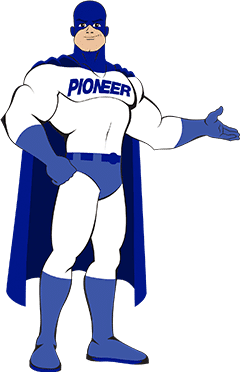Air conditioners are great when they work correctly, but when they don’t, homeowners find themselves turning to Google, typing “AC not cooling house” to get answers quickly. That’s why we’re here: to provide a troubleshooting tip or two!
We understand that AC units can stop working without much warning and oftentimes, it’s difficult to really pinpoint the reason. When you understand a few of the most common air conditioner problems, you’re in a much better position to fix your AC unit when problems do eventually strike your home.
How Does an Air Conditioner Work?
Your air conditioner extracts warm air from inside of your home and moves it outdoors. This helps with cooling during warm weather.
The cooling process starts with refrigeration. Your AC unit uses a chemical called refrigerant that vaporizes as it absorbs warm air and expels heat energy. The system uses this chemical to take out the heat from inside your home and releases this heat outside.
The unit begins blowing warm air that it takes from the return vent, and passes it through a filter and over an evaporator coil. The refrigerant cycles through the coil, taking in the heat and turning the chemical into gas. The cool air is then distributed back into your home.
Now, your refrigerant travels to the outdoor unit, where your compressor increases the chemical’s temperature. Once it reaches the condenser coil, the heat is released outside.
AC Not Cooling House? Here’s Why
Dirty Air Filter
The most common cause of an air conditioner not working is a clogged or dirty air filter. Dust, dirt, pet hair, pollen, or other airborne particles can easily build up and cause a dirty filter.
When air filters are clogged, the airflow through your AC unit is restricted. And as a consequence, the air conditioning system does not cool the way that it should.
Dirty air filters can also affect the way that your air conditioning system’s indoor evaporator coil and outdoor condenser unit work.
The easiest way to avoid any issues with dirty air filters is to make sure that you’re cleaning them regularly and changing them when needed. For most homes, the air filter needs to be changed every three months. But, if you have a large indoor pet that sheds, you may want to replace your air filter more often. Paying attention to your air filter can save you in the long run.
Low Refrigerant Levels or Refrigerant Leak
Air conditioning systems use refrigerants. This is a cool, liquid chemical that helps transfer heat energy from your indoor air and move it outside. When your refrigerant is low, then your AC unit may have difficulty with the cooling process.
There are two common reasons why your refrigerant may be low:
- The air conditioning system was undercharged during the installation process.
- There’s a refrigerant leak in your system.
Of the two causes, the most common is the latter. If you aren’t sure whether the culprit is leaking refrigerant or the installers, you need to speak with an HVAC professional right away. Refrigerant leaks can cause refrigerant poisoning. And, while this is rare, it isn’t a chance you need to take.
Dirty Evaporator Coil or Frozen Evaporator Coil
Your AC filters typically do a good job ensuring that your evaporator coil doesn’t get dirty, but over time, your evaporator coil can start to experience problems. In fact, your air conditioner does such a good job that most homeowners don’t know how to care for the evaporator coil.
Evaporator coils tend to accumulate buildup because they’re always humid. So, it’s incredibly easy for mildew to start building up in your AC unit, which affects their ability to function adversely.
Additionally, an evaporator coil can freeze over. This is what’s known as a frozen evaporator coil. This tends to happen when there isn’t enough refrigerant in your system.
Bad Connection to Outdoor Coil
Your outdoor disconnect is near your outdoor condenser fan. If the wiring inside of the disconnect box is loose, burned up, or damaged in any way, then your condenser coil and fan won’t be able to cool your home.
Leaking Cold Air
If you’ve recently had some uninvited guests in your attic, like pests, squirrels, rats, or other critters, then you may have damaged ductwork. There are also other causes of damaged ductwork.
For example, a plumber, cable installer, or another home repair technician could have accidentally damaged the ductwork in your attic.
Your air ducts distribute cool air throughout your home. So, if there are leaks, then you may mistake the issue for your air conditioner not cooling your home.
AC Compressor Malfunctions
Your AC compressor is what makes the entire air conditioning system operate. Your compressor circulates the refrigerant between your indoor unit and your outdoor unit. So, when the air conditioner compressor is damaged, your entire system cannot cool the warm indoor air the way that it should.
Before you move on to the next troubleshooting tip, it’s important to note that other electrical parts can also go bad. These parts may be smaller and less expensive, but when they go out, they’re often confused with a failed compressor. Two examples of this are:
- failed capacitor
- failed hard-start device
If your central air conditioning system is equipped with a ceiling saver or float switch, this will turn off your compressor if your home’s condensate drain is clogged. This is meant to prevent water leaks inside your home.
If your AC compressor isn’t turning on or has gone bad, then the only real option you have is to replace it. The issue with replacing the AC compressor is that it is expensive. So, unless you have a warranty specifically on this part, you may want to replace your entire outside unit.
Exterior Fan Motor Problems
The air conditioner’s fan inside the outdoor unit takes your home’s heat from the inside and should release heat outdoors when it works properly.
However, this fan can start malfunctioning. This causes your air conditioner’s compressor to overheat.
If you think this could be the culprit of your AC not cooling, then you should consult with a Shreveport air conditioner repair expert.
When your air conditioner’s fan motor goes out, then your fan won’t run, and your air conditioner will overheat. This normally doesn’t lead to an air conditioner not cooling but instead causes the AC system to shut down within a few minutes.
Thermostat Issues
Every central air conditioner installed has a thermostat that measures your home’s indoor temperature and adjusts the cold air blowing to accommodate your desired temperature.
If your thermostat has a problem, this will lead to problems with your AC service.
Thermostat Settings
However, more often than not, the thermostat isn’t actually broken. Instead, there’s a problem with the thermostat setting. One common example of a temperature setting being the culprit of your AC system not blowing cold air is that the thermostat is set to heat instead of cool.
Thermostat Batteries
If your thermostat needs batteries to operate, try changing out the batteries.
Thermostat’s Power Source
If you touch your thermostat and nothing happens, then a manual restart can be a quick and easy way to get your air conditioner running again.
Many of the newer thermostat models will start working after a hard reset. This means that you’ll need to remove your thermostat from the power source completely by flipping the circuit breaker. Let the unit power down for a few minutes, and then restart your thermostat.
Dirty Registers
Similar to the air filter, your air conditioner’s registers can get dirty. This typically happens when homeowners forget to clean the parts regularly.
Additionally, when a register is blocked, this is bad for your airflow. This typically happens by mistake. Oftentimes, a homeowner will put a piece of furniture in front of the register, and this restricts your home’s airflow.
When a register is dirty or blocked, your cooling system has to work harder to get proper airflow. This will increase your energy bills and keep your indoor unit from keeping your home cool.
This is possibly the most common problem for air conditioner problems, and the fix is easy. You’ll just need to remove your registers and vacuum them out with a brush attachment. You can remove any excess debris by running them through the dishwasher. And you’ll obviously want to unblock any registers that are blocked.
Excess Heat from Appliances
We’re sure that you’ve noticed how hot some appliances, like your laptop, television, or microwave, can get.
It’s your AC thermostat’s job to adjust to the proper temperature setting and regulate the cold air to meet that temperature. So, when you place appliances too close to your thermostat, this can affect your air conditioning unit’s ability to function properly.
You want to always ensure that there is plenty of distance between your thermostat and any electrical components that give off a lot of heat.
Excessive Outdoor Heat Energy
The reason that you invested in an air conditioner unit is to improve your indoor air quality. If your air conditioner can’t keep up on hot days, this can be extremely stressful.
But, if the sun is shining directly onto your thermostat, the excess heat can put your central AC unit in overdrive.
During the summer or when it’s extremely hot outside, we recommend keeping your curtains closed to help your AC system. If you only need to cool certain areas of your home, consider installing a mini-split system.
Lack of Proper Preventative Maintenance
One of the most common reasons for air conditioners not blowing cold air is the lack of proper maintenance.
While you may believe you do a decent job keeping your condenser unit clean, you need semi-annual air conditioner maintenance from a professional HVAC professional. We actually recommend scheduling maintenance for your AC unit twice a year in the spring and fall.
During the maintenance appointment, a professional HVAC technician will inspect all of the hard-to-reach AC parts. He or she will identify any potential issues that will need AC repair down the road and fix them before they lead to more expensive repairs.
Is Your AC Unit Not Cooling the House?
If your AC system isn’t adequately cooling your home, call Shreveport & Bossier City’s trusted AC repair professionals at Pioneer Comfort Systems. We provide prompt service for HVAC repair, and we’re confident we can get your AC running again quickly.
Contact us online or call 318-378-5729 for more information on our heating and cooling services.

